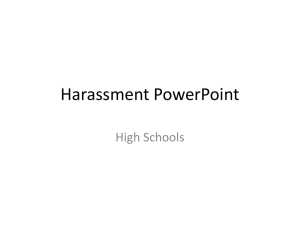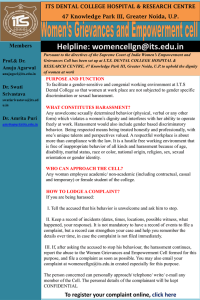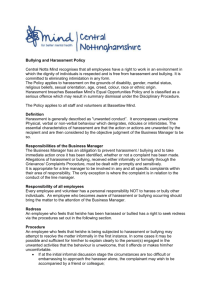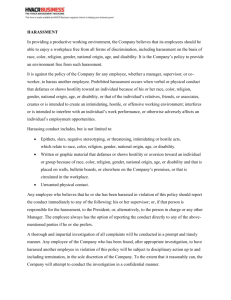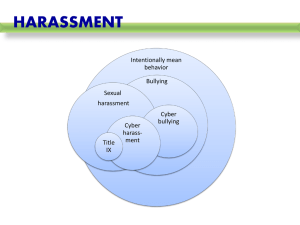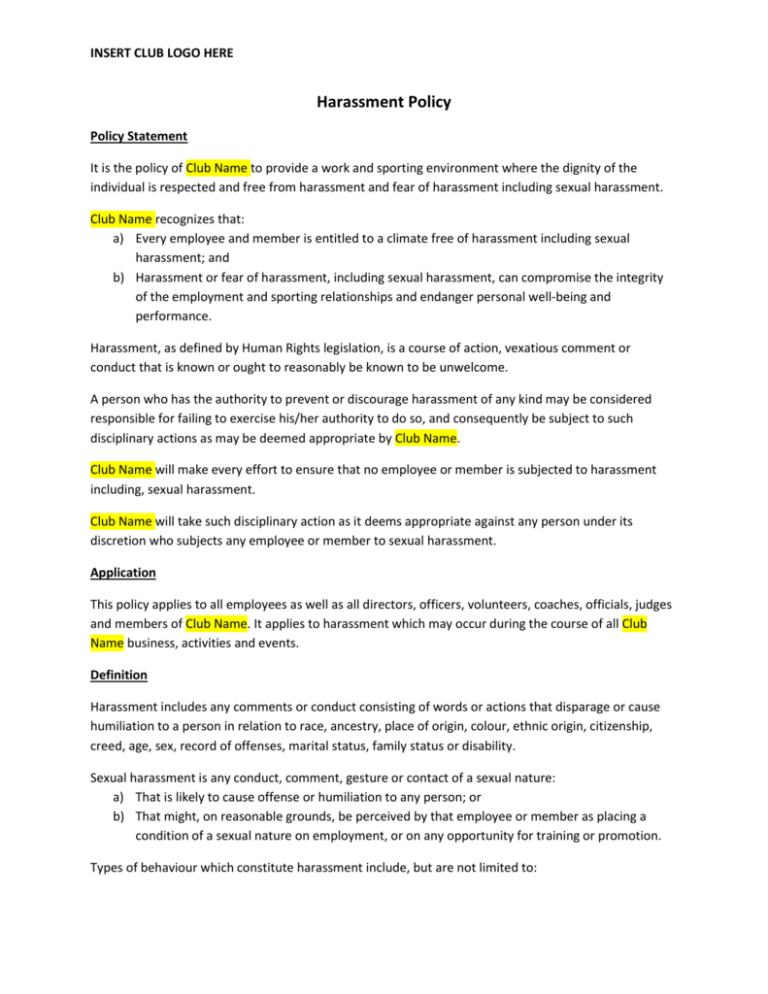
INSERT CLUB LOGO HERE
Harassment Policy
Policy Statement
It is the policy of Club Name to provide a work and sporting environment where the dignity of the
individual is respected and free from harassment and fear of harassment including sexual harassment.
Club Name recognizes that:
a) Every employee and member is entitled to a climate free of harassment including sexual
harassment; and
b) Harassment or fear of harassment, including sexual harassment, can compromise the integrity
of the employment and sporting relationships and endanger personal well-being and
performance.
Harassment, as defined by Human Rights legislation, is a course of action, vexatious comment or
conduct that is known or ought to reasonably be known to be unwelcome.
A person who has the authority to prevent or discourage harassment of any kind may be considered
responsible for failing to exercise his/her authority to do so, and consequently be subject to such
disciplinary actions as may be deemed appropriate by Club Name.
Club Name will make every effort to ensure that no employee or member is subjected to harassment
including, sexual harassment.
Club Name will take such disciplinary action as it deems appropriate against any person under its
discretion who subjects any employee or member to sexual harassment.
Application
This policy applies to all employees as well as all directors, officers, volunteers, coaches, officials, judges
and members of Club Name. It applies to harassment which may occur during the course of all Club
Name business, activities and events.
Definition
Harassment includes any comments or conduct consisting of words or actions that disparage or cause
humiliation to a person in relation to race, ancestry, place of origin, colour, ethnic origin, citizenship,
creed, age, sex, record of offenses, marital status, family status or disability.
Sexual harassment is any conduct, comment, gesture or contact of a sexual nature:
a) That is likely to cause offense or humiliation to any person; or
b) That might, on reasonable grounds, be perceived by that employee or member as placing a
condition of a sexual nature on employment, or on any opportunity for training or promotion.
Types of behaviour which constitute harassment include, but are not limited to:
INSERT CLUB LOGO HERE
a) Unwelcome remarks, jokes, innuendoes or taunting of a sexual nature about a person’s body,
attire, age, marital status, and/or which cause awkwardness or embarrassment, endanger a
person’s safety or negatively affect performance;
b) Unwelcome or intimidating invitations or requests with sexual overtones whether indirect or
explicit;
c) Leering or other gestures;
d) Unwelcome physical contact such as touching, patting or pinching;
e) Unwelcome display of objects or pictures of a sexual nature, and/or offensive or ought to be
known to be offensive;
f) Sexual advances, request for sexual favours, or other verbal or physical conduct of a sexual
nature;
g) Written or verbal abuse or threats thereof;
h) Physical or sexual assault;
i) Submission to or rejection of such conduct is used as the basis for decisions affecting
employment, promotion, or movement within the organization/team; and/or
j) Such conduct has the purpose or effect of humiliating an individual or substantially interfering
with the work or sporting performance or in creating an intimidating, hostile or offensive
environment.
Confidentiality
Club Name recognizes that it can be extremely difficult to come forward with a complaint of harassment
and that it can also be devastating to be wrongly convicted of harassment. Club Name recognizes the
interests of both the complainant and the respondent in keeping the matter confidential.
Club Name will not disclose the name of the harassed person or the circumstances related to the
situation to any person except where disclosure is necessary for the purpose of investigating the
harassment and/or taking disciplinary action.
Roles and Responsibilities
The ultimate responsibility for dealing with a harassment case rests with the Board of Directors. Since
any sexual harassment situation would constitute a highly sensitive subject matter, employees or
members have the choice of seeking council from their supervisor, coach, or the President/Commodore.
The Board of Directors and President/Commodore will:
a) Inform any person under its direction of Club Name’s Harassment Policy;
b) Provide clarification of what constitutes sexual harassment behaviour;
c) Inform any person under its direction of procedures for handling harassment complaints;
d) Initiate action without waiting for an individual complaint when harassment behaviour is known
to be taking place. To do otherwise will constitute misconduct on their part; and
e) Upon receipt of a formal harassment complaint the Director and/or President/Commodore
inform the alleged harasser and complainant in writing as to what action or investigation is to
INSERT CLUB LOGO HERE
take place and inform the harasser and complainant of the outcome of any action or
investigation in writing.
Complaint Procedure
1. A person who experiences harassment is encouraged to make it known to the harasser that the
behaviour is unwelcome, offensive and contrary to this policy.
2. If confronting the harasser is not possible, or if after confronting the harasser the harassment
continues, the complainant should request a meeting with the next high authority or official.
3. Once contacted by the complainant the role of the official is to serve in a neutral unbiased
capacity in receiving complaints and assisting their informal resolution. If the official considers
that he or she is unable to act in this capacity, the complainant shall be referred to another
official.
4. There are three possible outcomes to this meeting of complainant and official:
a. It may be determined that the conduct does not constitute harassment as defined in
this policy, in which case the matter will be closed.
b. The complainant may decide to pursue an informal resolution of the complaint, in which
case the official will assist the two parties to negotiate an acceptable resolution of the
complaint; or
c. The complainant may decide to lay a formal written complaint. The written complaint
must be submitted with the original signature of the complainant. No electronically
produced complaint will be accepted. All documented complaints will be treated as
highly confidential to protect all parties involved. The official shall receive the written
complaint; provide a copy to the respondent, who shall be given an opportunity to
respond in writing.
5. Once the respondent’s statement is received, the official shall provide copies of both written
statements to the President/Commodore of Club Name (or to another Director of the Board if
the President/Commodore is involved in the complaint). Within seven (7) days of receiving the
written statements, the President/Commodore shall appoint three (3) members of Club Name
to serve as the Panel. This Panel shall consist of at least one (1) woman and at least one (1) man,
and shall include one (1) individual who is knowledgeable and familiar with harassment issues.
Hearing
1. As soon as possible, but in any event within 14 days of being appointed, the Panel shall convene
a hearing The hearing shall be governed by such procedures as the Panel may decide, provided
that:
a. The complainant and respondent shall be given 10 days written notices of the day, time
and place of the hearing;
b. Members of the Panel shall select from among themselves a Chairperson;
c. A quorum shall be all three (3) Panel members;
d. Decisions shall be by majority vote. If a majority vote decision is not possible, the vote of
the Chairperson shall be the decision of the Panel;
INSERT CLUB LOGO HERE
e. Both parties shall be present at the hearing to give evidence and to answer questions of
the other party and of the Panel. If the complainant does not appear, the matter shall
be dismissed. If the respondent does not appear, the hearing shall proceed.
f. The complainant and respondent may be accompanied by a representative or advisor.
Should the complainant and/or respondent choose to have legal counsel, they shall be
responsible for any costs incurred.
2. As soon as possible but in any event within 14 days of the hearing, the Panel shall present its
findings in a report to the President/Commodore with a copy provided to both the complainant
and respondent. This report shall contain:
a. A summary of all the relevant facts;
b. A determination as to whether the acts complained of constitute harassment as defined
in this policy;
c. If the acts constitute harassment, recommend disciplinary action against the respondent
and recommend measures to remedy or mitigate the harm or loss suffered by the
complainant.
3. If the Panel determines that the allegations of harassment are false, vexatious, retaliatory or
frivolous, their report shall recommend disciplinary action against the complainant.
Discipline
When recommending appropriate disciplinary actions, the Panel shall consider factors such as:
The nature and severity of the harassment
Whether the harassment involved any physical contact
Whether the harassment was an isolated incident or part of an ongoing pattern
The nature of the relationship between the complainant and harasser
The age of the complainant
Whether the harasser had been involved in previous harassment incidents
Whether the harasser admitted responsibility and expressed a willingness to change
Whether the harasser retaliated against the complainant
In recommending disciplinary sanctions, the Panel may consider the following options, singly or in
combination, depending on the nature and severity of the harassment:
Verbal apology
Written apology
Letter of reprimand from the organization
A fine or levy
Referral to counselling
Removal of certain privileges of membership or employment
Demotion or pay cut
Termination of employment or contract
Expulsion from membership
INSERT CLUB LOGO HERE
Appeals
1. Both the complainant and respondent shall have the right to appeal the decision and
recommendations of the Panel. A notice of intention to appeal, along with grounds for the
appeal, must be provided within 14 days of the complainant or respondent receiving the Panel’s
report. It must be sent to the person identified in the internal dispute resolution process as
defined below.
2. Permissible grounds for an appeal are:
a. The Panel did not follow the procedures paid out in this policy;
b. Members of the Panel were influenced by bias; or
c. The Panel reached a decision which was grossly unfair or unreasonable.
3. Internal Dispute Resolution Process
a. When appealing a decision, the complainant or respondent also has an obligation to
recognize the structure, responsibilities and authorities of the different communities
within Club Name. As well, Club Name committees must understand that their actions
may be reviewed and changed by a higher authority.
b. Settlement of these disputes should be reached through an appeal procedure that
conforms to the principles of fairness justice and due process.
c. The appeal must be provided to the next highest authority. The head of that authority
shall either convene a meeting of his or her committee or a sub-committee of three or
more members. The person whose decision is being appealed shall not be a member of
the reviewing panel. It is expected that an appeal should be decided within 30 days of
receiving the written basis of the appeal.
Review and Approval:
The Harassment Policy was reviewed by the Board of Directors of Club Name on Date for approval on
Date.



